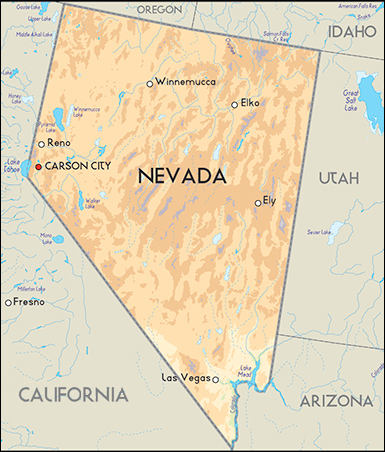By Jim Ellis — Friday, Feb. 9, 2024
President
Nevada Caucus: A Trump Sweep — Former President Donald Trump, as expected, won almost unanimous support last night at the Nevada Republican Caucuses where the state’s 26 delegates are apportioned. Trump will be awarded all of the state’s national convention delegates. Reports of high turnout around the state are numerous. A complete report will be forthcoming when the final results are formally released.Marianne Williamson: Draws Campaign to a Close — After placing behind the “None of These Candidates” ballot line in the Nevada primary, Democratic presidential candidate Marianne Williamson suspended her national campaign reducing the field to President Joe Biden and US Rep. Dean Phillips (D-MN). With the president recording a mean average of 93 percent in the last two primaries, it is already a foregone conclusion that Biden will clinch the Democratic nomination no matter how long Phillips remains an active candidate.
House
NY-3: Another Close Special Election Poll — Siena College, conducting a congressional poll for the Newsday publication (Feb. 3-6; 694 likely NY-3 voters) finds a tight special election race to replace expelled US Rep. George Santos (R).
The ballot test gives former US Rep. Tom Suozzi (D) a 48-44 percent edge over Republican Nassau County Legislator Mazi Melesa Pilip. A second survey, from Emerson College (Feb. 4-5; 742 likely NY-3 voters; multiple sampling techniques), reported a similar result: Suozzi leading 52-48 percent when respondents were pushed for a choice between the two candidates. Previously, Emerson conducted a survey in mid-January (Jan. 13-15; 975 registered NY-3 voters; multiple sampling techniques) again finding Suozzi holding a similarly small 45-42 percent edge.
All of this data suggests that the Feb. 13 special election contest is within the polling margin of error and will come down to a turnout battle between the Democratic and Republican teams. The survey research suggests the race is close enough that the side doing a better job getting their voters to cast a ballot will claim the seat in the special election.
WA-5: Rep. Cathy McMorris Rodgers (R) to Retire — Another House member has joined the retirement list. Ten-term Washington US Rep. Cathy McMorris Rodgers (R-Spokane), the House Energy & Commerce Committee chair, announced yesterday that she will not seek re-election later this year. In a long statement that thanks and extolls the virtues of her eastern Washington constituents, McMorris Rodgers formally announced her political intentions.
The open seat count now returns to 47, accounting for Rep. McMorris Rodgers retiring and Indiana Rep. Victoria Spartz (R-Noblesville) changing her mind about not seeking re-election. Within the group, 24 Democrats are not seeking another term in the House, and the Republican number now grows to 22. The new Alabama redistricting plan creates an open seat that begins in Montgomery and stretches to Mobile.
The 5th District of Washington occupies the furthermost eastern part of the state from Canada to Oregon and is anchored in the city of Spokane. The FiveThirtyEight data organization rates WA-5 as R+17. In the 2020 election, former President Donald Trump won the district by a 53-43 percent margin. The Daily Kos Elections site statisticians rank the district as the 56th most vulnerable seat in the Republican Conference. We can expect a crowded jungle primary in August leading to a general election where the Republican candidate should be favored.



 Feb. 25, 2020 — While the Nevada Caucus counting drags on and tabulations will at some point determine just how many delegates Sen. Bernie Sanders (I-VT), former Vice President Joe Biden, and ex-Mayor Pete Buttigieg receive from the state – currently, it appears that Sanders will win somewhere between 19 and 23 bound delegate votes, while Biden and Buttigieg should both earn bound votes in the high single digits – a new US Senate poll is proving more curious today.
Feb. 25, 2020 — While the Nevada Caucus counting drags on and tabulations will at some point determine just how many delegates Sen. Bernie Sanders (I-VT), former Vice President Joe Biden, and ex-Mayor Pete Buttigieg receive from the state – currently, it appears that Sanders will win somewhere between 19 and 23 bound delegate votes, while Biden and Buttigieg should both earn bound votes in the high single digits – a new US Senate poll is proving more curious today. Feb. 24, 2020 — It is becoming clearer that the Democratic presidential contest could result in an open, or “brokered”, convention. This would occur if no candidate secures majority support after the electorates in all the voting entities have cast their ballots and the delegates’ first ballot tallies are locked into place under the individual state laws.
Feb. 24, 2020 — It is becoming clearer that the Democratic presidential contest could result in an open, or “brokered”, convention. This would occur if no candidate secures majority support after the electorates in all the voting entities have cast their ballots and the delegates’ first ballot tallies are locked into place under the individual state laws.
 Jan. 16, 2020 — The most recent early-state polling again underscores the distinct possibility that we will not see a clear Democratic presidential leader emerge before Super Tuesday.
Jan. 16, 2020 — The most recent early-state polling again underscores the distinct possibility that we will not see a clear Democratic presidential leader emerge before Super Tuesday. Aug. 22, 2019 — The Nevada Caucus is third on the presidential nomination schedule and it appears the Silver State nomination event will carry more weight than it has in past elections.
Aug. 22, 2019 — The Nevada Caucus is third on the presidential nomination schedule and it appears the Silver State nomination event will carry more weight than it has in past elections.